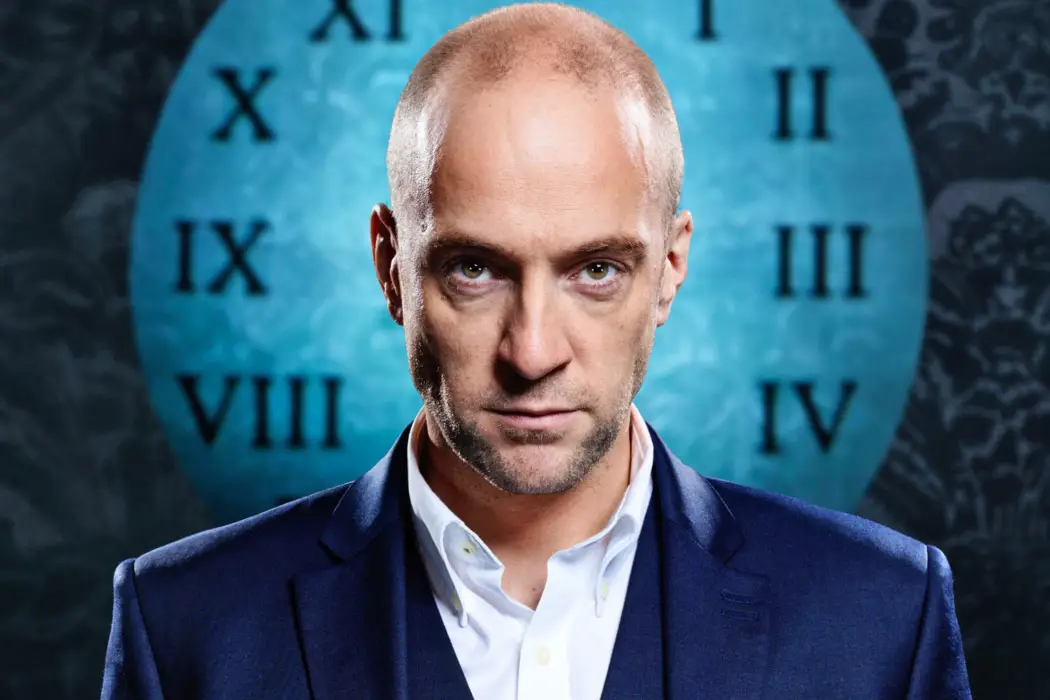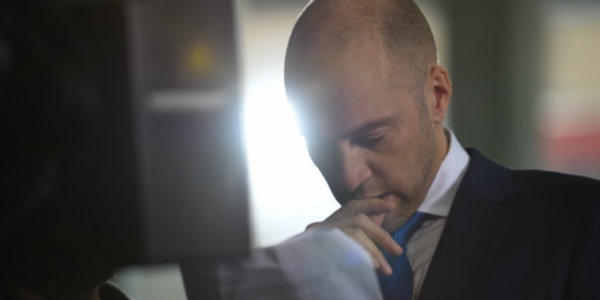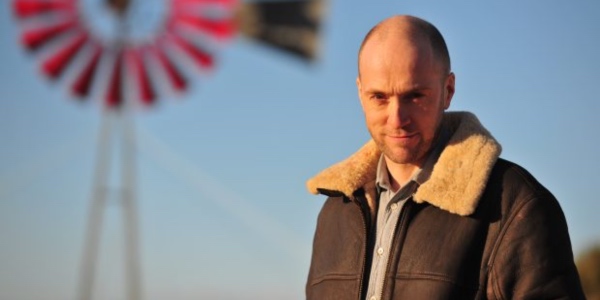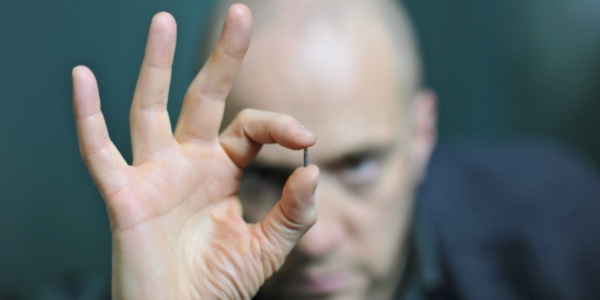“It’s About The Things That Lie In Between Political Narratives” – Interview With Derren Brown Of SACRIFICE

Matt is a critic from the UK.
Derren Brown has achieved success in the UK through his work on television, stage and in non-fiction. After starting as a mentalist and illusionist twenty years ago, Brown has developed into a one-of-a-kind performer, guiding unwitting members of the public through real life challenges and dramas live on-screen. In recent years these social experiments have included convincing a member of the public the world has ended, and convincing another that he has been left to pilot a plane at 30,000 feet.
His newest show, Sacrifice, airs on Netflix on October 19th. In this new special, Brown attempts, through suggestion and conditioning, to persuade a member of the public to take a bullet for a complete stranger. The aim of these shows is to change the perceptions of those involved, tackling social conformity, promoting self-confidence, and in Sacrifice, kindness.
I spoke to Derren to understand more about the show, his development as a performer, and his future projects.
Matt Singleton for Film Inquiry: Sacrifice seems like perhaps your biggest project, with intricate set pieces and a cast of over 100 people in the UK and America. Are projects of this scale what we should expect in future from you?
Derren Brown: I try and keep things fresh. I like to vary things a bit, so if I do a few [projects] that are quite big, I like to do something then that’s a little more intimate. I did a show called Apocalypse (2012), [where I] ended the world for a guy and then he woke up in this zombie infested post-apocalyptic world. The next show after that was some pensioners stealing a painting from a gallery (2013’s The Great Art Robbery). So I like to mix it up a little bit.
The last special that is on Netflix, is The Push, which has got a quite relentlessly, kind of funny but dark journey and I wanted to do something that would contrast with that. This is a much more positive story. That’s the joy of doing the TV stuff: being able to engage with that scale and the audacity, that’s fun. [I’ve] certainly no intention of stopping any time soon. It’s great to have this opportunity to do it for Netflix.
Sacrifice in particular feels very current, it feels very of the time. Was this a direct reaction to the world around you?
Derren Brown: Yeah, I wanted to do something that was resonant. It just made sense. Most of the shows that I’ve done are about stranger aspects or corners of the human condition, which I think have resonated for me, for example about compliance. Actually The Push when it aired on Netflix (it originally aired on television in the UK in 2016) suddenly felt more current because of issues of people doing bad things and so on. That was sort of by accident but this was certainly more out of choice.
Although it’s not an overtly political show, for me it’s about being human really, and about kindness, and about the things that lie in between those political narratives and lie outside of those strict stories that we attach ourselves to. So although it has that kind of resonance it’s ultimately for me about the areas in between where I think humanity emerges. Because there’s not much of that around now. There’s not a lot of meat in the middle left now, everyone’s so polarised. So that’s where it sort of happens I think.
I feel that definitely comes across in the special.
Derren Brown: That’s good.

So you spoke about working with Netflix. Working with Netflix and knowing your work will be seen not only in the UK and the US but across the world, how does that impact the stories that you choose to tell?
Derren Brown: It impacts them a little. I think what it will do is just open them up – the content of the show – geographically a little bit. So rather than them all being filmed in and around London, it makes sense to broaden that scope a little bit. But equally I try not to plan things too much. There’s always a point where we have a couple of weeks to come up with the idea for the next show and then I just look at how things are at that point and what feels important and interesting, and learning from previous things that I’ve done. So it is very hard to say.
The other thing that’s interesting, and different for me, is not so much the worldwide aspect but the fact the shows sit there now and people can discover them at any point. That’s very new to me and I’m kind of used to a show that goes out on a certain date and you hope people will watch it on that date and if they haven’t that’s it and they’re gone. They largely miss their chance unless they were to search for it and watch it on catch-up. It’s very different now that it sits there. There’s a couple of shows on Netflix now that have been around for a couple of years in the UK and I’m having people discover them for the first time. And of course they feel fresh and new to them. All that’s strange and different.
I guess it’ll depend on how the relationship with Netflix continues as to whether they’ll want any other shows. I’ve no idea at this point but hopefully they will and hopefully it’ll continue. And I think I’ll just react to it as and when those projects come up. But I expect at the very least there’ll be a kind of [attempt] to include the world stage a little more into the editorial content.
Like you did with America coming into this one I suppose?

Derren Brown: Yeah exactly. I’ve filmed stuff in America before, but this is a story that made most sense for it to happen there.
So in Sacrifice, your main aim is to convince a man to take a bullet for a complete stranger. How confident are you when working with a member of the public in a setting like this where you’re detached from the action? You’re left to watch the decisions from behind a camera. This is obviously a contrast to your stage shows where you’re in complete control of the member of the public or the audience on stage with you. It’s a completely different level of risk for you.
Derren Brown: Yeah it’s different. It’s a different thing because if something doesn’t work with the TV then that’s fine. I mean there’s the risk of it not working and not coming together, and you see within the show that there are failures and things that don’t work out. But of course you’ve got the opportunity to go “Okay that didn’t work” and then to maybe find something that would then continue the story, or allow the fact it didn’t work to sit more comfortably within the narrative, rather than it just being a disappointing ending. And The Push is a good example of that. In fact we were looking at the issue of “well if this works, if he pushes the guy off the building, is that just going to be what everybody expects?” So it is actually, incorporating the question of failure within an ending that works, and you see that play out in that show. So there are ways of allowing for that, and it doesn’t mean that the whole project is suddenly a huge waste of time.
What amazes me from having done, well I’ve done 20 years of shows in the UK, but maybe 8 or 10 years of this kind of thing, putting people through these kinds of journeys, is how well they do follow the tracks that I lay down for them. It sort of surprises me.
An interesting part of the job actually is convincing the production teams, that are normally new for each show so they haven’t had the kind of experiences making these, that these things should work, communicating my confidence.
It’s an odd one because really no-one knows [if it will work], but it makes for a very emotional experience being in that little truck or gallery watching the thing happen. Obviously we’re just around the corner because if there’s anything traumatic that happens that I need to run in and stop it, so obviously I need to be nearby. There were a couple of the team there from Netflix in tears and a director in tears. They’re kind of extraordinary things to be part of, particularly for those like me and those of us closest to it, because we spend months and months setting these things up.

You emotionally go through the journey with the participant too. Which is why they’ve all ended up being friends of mine and we’ve all kept in touch. I got Phil (the participant in Sacrifice) over from America to watch the show as soon as I had a copy of it. And I got the other guys from previous shows, the guy from The Push and the guy from Apocalypse, both of whom had been through not dissimilar journeys. I wanted them all to meet so that Phil would have this kind of, not quite a support group, maybe that’s too strong a word, but certainly a little network of people who have been through similar things. It’s a wonderful, extraordinary, emotional thing and that tension and risk of whether it will work is a big part of that.
You have changed course with each show, with each project that you undertake. Each one is a detour from the themes and ideas of the one before. That’s going from your stage shows to your television shows, to your book on happiness and philosophy, and most recently your street photography collection. Are these detours conscious decisions you make to mix things up and continuously challenge yourself?
Derren Brown: Yeah. I think I would have grown out of the urge to do magic quite early in my thirties if this career hadn’t taken off. So quite consciously I was sort of thinking “I’m either going to stop this and do something else” because just trying to impress people with magic tricks, which is sort of what I was doing at the time – mind reading tricks – is such a childish thing. I thought “I’m either going to stop that or I need to let it change and grow up with me and become something else.” That’s really what has happened at least over the last maybe 10 or 15 years. This is why the shows have become about real people going through these real life dramas. It’s a more interesting premise. It’s certainly a more dramatic premise that just some guy showing off, which has very little dramatic value and it’s not going to sustain your interest for that long.
I’ve tried to let the shows grow up with me, and the things that I find interesting or the things that I read about or think about and just generally absorb in my life, which otherwise would have nothing to do with TV shows, or certainly nothing to do with magic or anything like that, have naturally come to inform it. Because then it’s a way of finding honesty and integrity and something grown up in an otherwise partly dishonest and childish craft. Magic is the biggest, most fraudulent route to impressing people and most of the time you’re kind of cheating. That’s part of it, and it’s part of the fun of it as well. I’ve just tried to let it grow up into something else.
It’s strange because the same time the book came out on Happiness I was on a ghost train in Thorpe Park (Derren Brown’s Ghost Train is an attraction at British Theme Park, Thorpe Park). To have these shows at the same time, it’s a strange kind of remit that I now have. I don’t really know how to describe myself in terms of what I do, but it’s a nice place to be because I can just take the things that I think are important or fun or worthwhile and use them as a backbone to these dramatic hooks. I’ve always tried to do that: combine a strong dramatic hook that would make you want to watch or pique your interest, with a good reason for doing it. I think if you don’t do that [it’s] going to be controversial or sensationalist just for the sake [of it], and that’s not very interesting. So yes they grow up and shift with me.
Are there any topics you have a burning desire to tackle in your upcoming projects or is this secret?
Derren Brown: Well not quite. I’m starting to get my head around another book following on from Happy. That’s leading me down other roads to do with how we live and how we think, and how we can do those difficult tasks as well as possible. [laughs] So they will feed into future projects but they’re not clarified enough yet for me to know what they are. And in terms of ideas for that big dramatic hook I really try not to think ahead. Because when I come to do them it’s a good 8 months of hard work normally so I want to make it something that feels very interesting and worthwhile at the time. One way I’ve found of maintaining that interest myself is not to just have a back-catalogue of ideas but to approach it totally totally fresh each time. So… no. [laughs]
That’s a good enough answer for me.
Film Inquiry would like to thank Derren Brown for taking the time to speak with us!
Derren Brown: Sacrifice will be released on Netflix on October 19th 2018.
Does content like this matter to you?
Become a Member and support film journalism. Unlock access to all of Film Inquiry`s great articles. Join a community of like-minded readers who are passionate about cinema - get access to our private members Network, give back to independent filmmakers, and more.
Matt is a critic from the UK.












